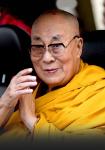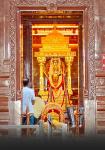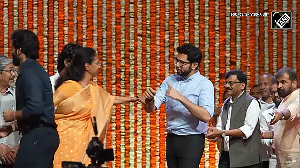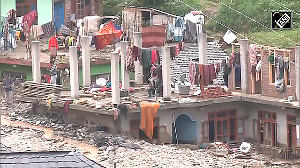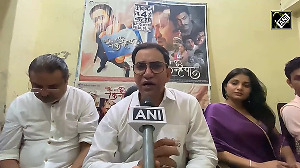The right-wing political party's leader returned to Dhaka on November 3 from a week-long India visit that she termed as "highly successful".
On Saturday, Zia met President Pranab Mukherjee. A statement from the President's Office said that Mukherjee praised the role of Khaleda as the opposition leader and as the former prime minister of Bangladesh.
Mukherjee told Khaleda that New Delhi accorded highest importance to its relations with Bangladesh as a close neighbour and hoped that the diplomats of both countries will work sincerely to further strengthen the ties.
Khaleda Zia responded by saying that her party is interested in establishing friendly relations with India.
Before boarding her plane at for Dhaka on Saturday, Zia told members of the Bangladesh media, "My visit to India was highly successful. I discussed with Indian leaders how to strengthen Bangladesh's relations with India and my talks were fruitful."
When asked whether the BNP is about to change its policy towards India, she said rather indirectly, "We have to do everything through talks".
During her weeklong stay in India, Khaleda also met Prime Minister Manmohan Singh, newly appointed Foreign Minister Salman Khurshid, Bharatiya Janata Party leaders Sushma Swaraj and Nitin Gadkari besides Foreign Secretary Ranjan Mathai and National Security Adviser Shiv Shankar Menon.
During her visit, Zia already made a number of commitments to top officials of the Indian administration. Immediately after Zia's meetings with Menon and Khurshid, BNP vice-chairman Shamsher Mobin Chowdhury told the media that when Menon expressed interest about a deep-sea port project at Sonadia in Bay of Bengal of Bangladesh, Khaleda Zia welcomed the idea for a consortium including India, China and other countries for the project would need a "huge amount of investment" and would also "benefit Bangladesh, India, China and Thailand".
Khaleda, who had visited China during the third week of October, also assured India that Beijing is "receptive" to India's participation in the consortium, according to Mobin.
Mobin also said that during Zia's meeting with Khurshid, all bilateral issues -- including trade, terrorism, border killings and water-sharing -- were discussed.
Mobin told the media that Khurshid has assured Zia that he would take a personal initiative to talk to all shareholders about the Teesta water-sharing issue, a deal which could not be inked in September last year due to West Bengal Chief Minister Mamata Banerjee's opposition.
Earlier, during her India trip, Zia had assured New Delhi that the BNP would not allow Bangladesh territory to be used by terrorists to target India, while admitting to providing sanctuary to insurgents from north-east India during her tenure between 2001 and 2006 in Bangladesh. This is a sharp U-turn from BNP's past stance regarding the problem of cross-border illegal migration and presence of militants in Bangladesh.
Earlier, BNP was firmly averse to Bangladesh providing transit to India. Even on July 13, 2011, protesting the provision of transit to India was one of the many motives behind BNP's mass hunger strike in Dhaka.
Back then, Khaleda Zia had said, "We got independence by sacrificing our blood. We will never let the government give a corridor to India through our land. We will resist such an attempt."
But during her India visit, Zia was quoted as saying by various media reports that transit should be provided to India "as part of the total connectivity of the region."
This drastic change in her stance is being welcomed by BNP leaders in Bangladesh and is also being lauded by the Indian administration.
In a report titled It was a mistake, published by the Daily Star in Bangladesh on November 2, many BNP insiders had said that "realising that its long-held stance was a mistake, the party appears to be making a turnaround in its policy towards the big neighbour".
The report mentioned that this change is due to the "changing socio-economic and political conditions at the national, regional and global level".
The report also mentioned that at least three BNP leaders said that Jamaat-e-Islami and Islami Oikya Jote, two allies of the 18-party alliance that BNP leads, along with some BNP policymakers and close aides to Khaleda Zia had convinced her to take the anti-India position.
Although Khaleda had last visited India as the prime minister of Bangladesh in 2006, discord between India and BNP began when the latter was in power in Bangladesh in 2004, when 10 trucks full of arms were seized in Bangladesh, which, India suspected, were being smuggled into north-eastern parts of India to aid separatist groups.
Also, corruption during the BNP's tenure and a grenade attack on the Awami League's rally on August 21, 2004 worsened the relations between BNP and India.
However, this seems to be changing with the change in BNP's attitude.
The trip by Khaleda Zia and top leaders of her party follows a similar trip to China during the third week of October. The party chairperson and her delegation plan to visit United Kingdom and the United States in December and January of 2013.
The tenth national parliamentary elections of Bangladesh are scheduled to be held in December 2013.

